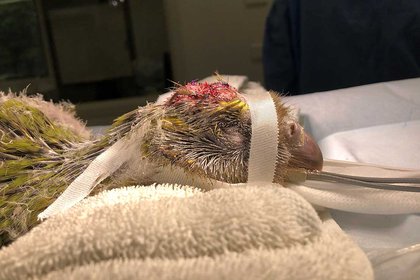
A young kākāpō chick has undergone life-saving brain surgery at Massey University’s Wildbase Hospital to treat a developmental problem of the skull, a world-first procedure, adapting surgical techniques from humans and other mammals.
Known as Espy 1B, the now 56-day-old wild-hatched kākāpō chick from Whenua Hou/Codfish Island was in the care of the Department of Conservation’s Kākāpō Recovery Team when rangers noted an unusual lump on its skull soon after hatching. The chick was sent to the Dunedin Wildlife Hospital for a CT scan as soon as it was old enough.
Director of Wildbase Hospital Professor Brett Gartrell says they found there was only a thin layer of tissue between the brain and the outside world.
“The CT scan showed that the plates of its skull had not completely fused and the fontanelle was still open. The chick was hatched with a hole in its skull that allowed part of the brain and dura (the tough barrier around the brain) to herniate out, the technical term for this condition is a meningoencephalocoele.
“In humans, this spot fuses after birth, but this is highly unusual in birds as the skull has finished fusing prior to hatch. The concern was that if this tissue was damaged this would open the brain to trauma and infection.
“With only 144 kākāpō left in the world, this condition could be life-threatening for the critically endangered bird, so action needed to be taken, but nothing like it had been attempted before in avian medicine.”
A national effort
A national group of veterinarians, including veterinarians from Auckland Zoo, Wellington Zoo and Dunedin Wildlife Hospital, conferred to determine that surgery was the best way forward for the chick.
Air New Zealand flew the kākāpō for free to Massey’s Wildbase Hospital for the surgery. Led by Professor Gartrell, a team of veterinarians and veterinary technicians at Massey carried out the pioneering surgery last Monday.
Professor Brett Gartrell says they based the surgical plan on what is used for this condition in humans and other mammals and then extrapolated these techniques to the peculiarities of avian anatomy.
“This is a risky surgery and the common complications for this surgery in humans include permanent brain damage, continued leakage of cerebrospinal fluid and the possibility of meningitis.”
In the surgery, the team made an elliptical incision around the area and then reflected a flap of skin, which enabled them to carefully dissect out the herniated dura from the fontanelle. The surgical team were unable to reduce the herniated tissue back into the skull, so they clamped and resected a small piece of brain and dura. A small square of synthetic mesh was sutured in place over the open fontanelle. This was secured tautly and was successful in reducing the bulge at the site of the fontanelle. The mesh graft was then infused with bone marrow.
The skin flap was then sutured back in place over the patch. Professor Gartrell describes the surgery as “intense”.
Kākāpō recovering well at Wildbase Hospital.
A remarkable recovery
The chick has made a remarkable recovery after surgery and has quickly bounced back to being a healthy growing chick. The bird will be transferred back to the Dunedin Wildlife Hospital later this week so that it can be paired up with another kakapo chick to minimise the risks of imprinting on people.
“This was only possible because of a national collaboration with vets and conservation workers,” Professor Gartrell says.
Massey Univeristy Vice-Chancellor Professor Jan Thomas says the work showcases the talent and innovation at Wildbase Hospital.
“The ground-breaking work being done by the hospital is at the forefront of wildlife conservation and contributes to a New Zealand effort to protect our native species. While this case is a shining example of their pioneering spirit, they continue that vein of excellence in the research and teaching within the School of Veterinary Science.”
About Wildbase Hospital
Wildbase Hospital is a dedicated wildlife hospital that runs within Massey University’s School of Veterinary Science and provides veterinary services and research to support conservation in New Zealand. The hospital relies on sponsorship and donations. You can find out more here.